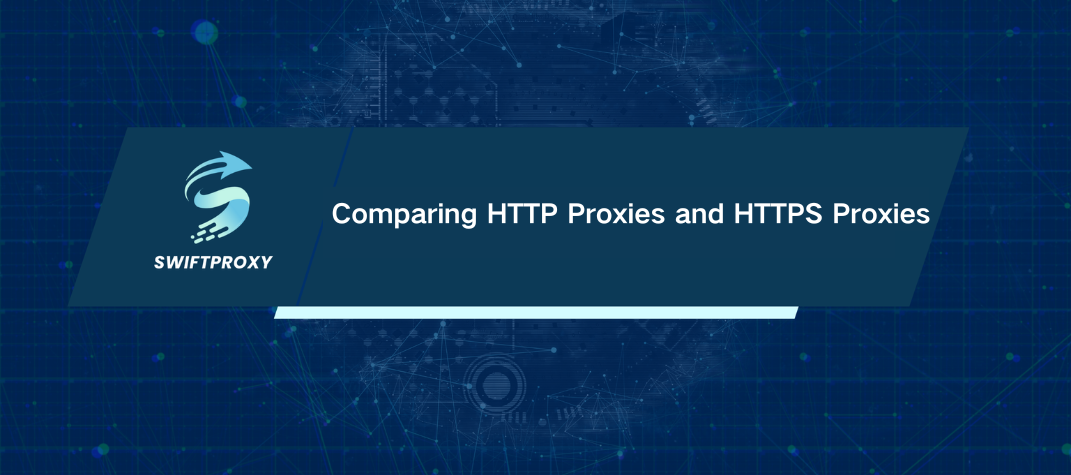Comparing HTTP Proxies and HTTPS Proxies

If you're new to proxies, you might have encountered terms like "HTTP" and "HTTPS" and wondered about their differences. It's understandable—these concepts can get confusing, even for experienced users. Proxies are primarily used to boost security and enable anonymous browsing, but choosing the wrong type of proxy server can compromise your privacy or lead to compatibility issues.
In this blog, we'll clarify what an HTTP proxy is, explore the common types of HTTP proxies, and explain the differences between HTTP and HTTPS proxy servers.
Essential Information About HTTP and HTTPS Proxies
HTTP (HyperText Transfer Protocol) is the standard protocol used for accessing the internet. An HTTP proxy acts as an intermediary between your device and the web server you're trying to reach, whether that's a website, online app, video game, streaming service, or another online resource. Here's how the connection process works with an HTTP proxy:
Request Transmission: When you make a request, it first goes to the proxy server in plain text.
Request Processing: The proxy server processes this request and forwards it to the destination server, replacing your IP address with its own.
Response Handling: The destination server sends the response to the proxy server.
Data Forwarding: The proxy server then forwards the response data back to your device.
Many people worry that these additional steps might slow down the connection between a device and the internet. However, that's not the case. With a high-quality proxy, the delay is just a matter of milliseconds, so brief that you won't even notice it!
Types of HTTP Proxy
Here are the three types of HTTP proxies you might encounter. The primary distinctions between them relate to the level of anonymity they offer.
· Anonymous proxy
This type of proxy server is commonly used to mask your IP address, and you’ll often encounter it in free VPN or proxy services. It works by replacing your IP address with its own for each request. However, it also identifies itself as a proxy when interacting with other servers, which can sometimes lead to issues.
If you need to access a site that's restricted in your region, an anonymous proxy won't help. Additionally, it won't work for websites, apps, games, or streaming services that either don't support or permit the use of proxy servers.
· Highly anonymous proxy
This type of proxy server also masks your IP address by replacing it with its own, just like an anonymous proxy. However, highly anonymous proxies go further by not revealing themselves as proxies. They employ advanced techniques to avoid detection and ensure they aren't identified as proxies.
A highly anonymous proxy will certainly keep your browsing private. However, it's not ideal for tasks involving sensitive information, such as financial transactions, because it still uses the unprotected HTTP protocol. On the other hand, highly anonymous proxies are well-suited for accessing various types of geo-restricted content.
· Transparent proxy
Educational institutions, companies, and government agencies often use transparent proxies to block access to certain websites. These proxies operate continuously and don't require any credentials. If you've tried to visit YouTube or play an online game on a school or work laptop, a transparent proxy is likely the reason you couldn't access those sites.
As the name implies, transparent proxies do not alter your requests, so every server you interact with can still see your IP address. Their primary function is to block users on a network from accessing inappropriate content.
What Is the Difference Between HTTP and HTTPS Proxies
The main difference between HTTP and HTTPS proxies is in how they handle communication, and it's a significant one. With an HTTPS proxy, rather than routing requests through the proxy to the server, the proxy establishes a direct TCP connection. This setup allows for end-to-end encryption, greatly enhancing security. All data is encrypted except for the information needed for routing.
When to Use an HTTP or HTTPS Proxy
The best type of proxy for your needs will depend on your specific scenario. Here are a few situations where an HTTP proxy is a great choice:
· Streaming Media
· Data Collection
· Website Surveillance
· Task Automation
To be clear, while an HTTPS proxy can handle all these tasks, it offers enhanced security. This makes it a much better choice for anonymous browsing, payment transactions, and avoiding website tracking. It is also more effective for web scraping on sites with stringent anti-bot measures.
Final Summary
HTTP proxies were highly popular over the past decade or two. However, as IT has shifted focus toward enhanced security in recent years, their prominence has declined. Nevertheless, they are not obsolete. HTTP proxies remain a valuable, cost-effective choice for those who simply need a different IP address for various reasons.
Whether you're looking for HTTP or HTTPS proxies, we have the solution for you. All Swiftproxy proxies are designed with reliability, speed, and privacy in mind. Plus, our support team is always on hand to assist, and our prices are unbeatable!

















































